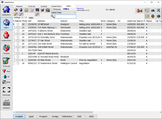It used to be a pain to copy and distribute information to buyers. This is no longer the case. Salespeople can share large documents using email and cloud based file sharing applications. Apps such as Dropbox are being used to share:
- LIM reports
- Building reports
- Sale & Purchase Agreements
- Disclosures
In the past, it was practically a lottery when it came down to which buyers received follow up attention. Technology has made it easier to follow up numerous potential buyers in a timely manner. Today's buyers (like their salespeople) are also using email and SMS to communicate with their circle of advisers.
3. Contracts and offers
Distributing contracts and completed offers has been transformed. Remember the lamented fax machine? These days, contracts are often completed electronically, and it is not uncommon to receive an offer in the form of an email attachment.
4. Resources
From zoning to demographics, the availability of property related information is staggering. New features like radius property-search demonstrate how some websites are dramatically improving the search experience for buyers.
Here are some widely used technologies which have impacted real estate;
- QR codes,
- Smartphone applications,
- Online banking,
- Tailored listing alerts from real estate websites,
- Property maps (remember when you had to ask the agent for the street address?),
- Public access to sales data.
5. Activity tracking
Salespeople are using software to record activity, leading to better outcomes for buyers and sellers. The marketing methods which bring multiple offers together were a lot harder to manage without today's technology. And now people expect a lot more information than they used to.
6. Big Data
With the increasing availability of market data, salespeople can back up their assertions and present opportunities to buyers and vendors with less emotion and more professionalism. Due diligence has been transformed. District council websites provide online access to rating valuations and aerial photos. Salespeople can quickly perform a Title search online.
7. Social media
Although it is presently underutilized from a real estate standpoint, Social media is starting to reveal enormous potential.
What does the future hold for real estate technology?
- Real estate websites and software will be used to send SMS alerts with mobile optimized links, so that you can view new listings from your smartphone the moment they become available.
- Real estate sales teams currently use systems (sometimes referred to as 'Jungle Drums') to communicate with each other via SMS about listing changes and deadlines. Soon, buyers and sellers will also expect to be kept informed about changes in real time. Pioneer salespeople are already doing this.
- Individual listings will have their own Twitter accounts, and you will be able to follow @87MainRoad to receive notifications.
- Advertising expenditure will continue shifting towards online advertising, but will stop being solely portal based. Monetized ad campaigns on Facebook and Google will become commonplace. For a fraction of the cost of traditional advertising, you will be able to reach thousands of potential buyers who match your listing's profile based on location, financial status, employment, and family situation.
- As smartphones become faster and more intuitive, open home directional signs will become redundant, because your smartphone GPS will guide you to your open home destination.
- Open home visitors will be able to use their smartphone's Near Field Communications (NFC) system to check-in at open homes, and obtain listing information. Contact-less technology may allow visitors to register and receive updates on the property they are visiting.
- Software applications may be used to book appraisals and inspections. Salespeople will be able to allocate available times using online diary systems so that buyers and sellers can book appointments using the internet.
- Foot traffic marketing will become more sophisticated. In shopping malls for example, static paper based real estate displays will morph into digital kiosks. Rolling picture shows and touchscreens will allow you to browse listings. Extra information will be available via Bluetooth connection, and you may be able to "chat now" with an on-duty agent using Skype.
- Collation and analysis of data could lead to the discovery of algorithms which identify likely future sellers. Software could allow you to locate particular areas which have a high turnover per capita, so that your prospecting ROI is better.
- Buyers and sellers might use crowd sourced review sites like TripAdvisor to compare agents.


 RSS Feed
RSS Feed

